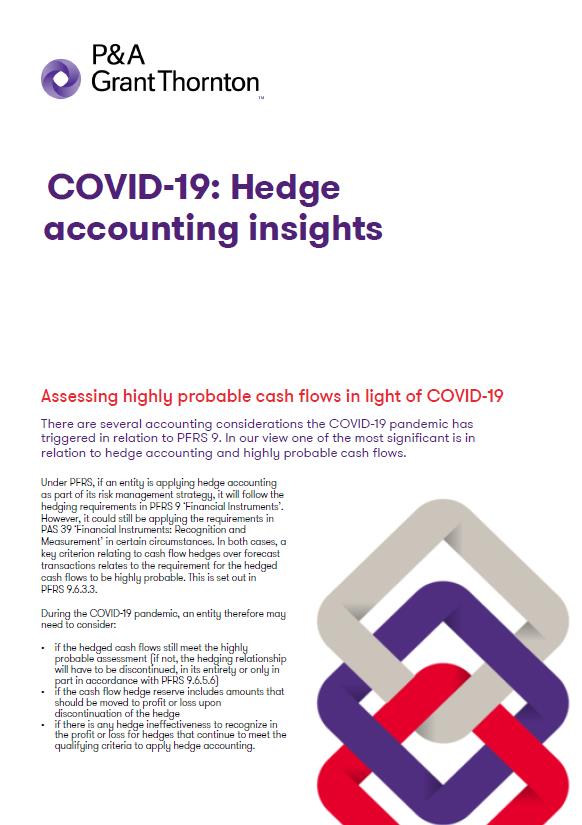This Accounting Alert is issued to provide insights on accounting considerations on hedge accounting and highly probable cash flows, as affected by the COVID-19 pandemic.
Background
There are several accounting considerations the COVID-19 pandemic has triggered in relation to Philippine Financial Reporting Standard (PFRS) 9, Financial Instruments. In our view, one of the most significant is in relation to hedge accounting and highly probable cash flows.
COVID-19 pandemic considerations
Under PFRS, if an entity is applying hedge accounting as part of its risk management strategy, it will follow the hedging requirements in PFRS 9. However, it could still be applying the requirements in PAS 39, Financial Instruments: Recognition and Measurement, in certain circumstances. In both cases, a key criterion relating to cash flow hedges over forecast transactions relates to the requirement for the hedged cash flows to be highly probable.
During the COVID-19 pandemic, an entity may need to consider:
- if the hedged cash flows still meet the highly probable assessment (if not, the hedging relationship will have to be discontinued, in its entirety or only in part in accordance with PFRS 9.6.5.6);
- if the cash flow hedge reserve includes amounts that should be moved to profit or loss upon discontinuation of the hedge; and,
- if there is any hedge ineffectiveness to be recognized in profit or loss for hedges that continue to meet the qualifying criteria to apply hedge accounting.
Highly probable forecast cash flows’ assessment
The requirement to meet the highly probable assessment is crucial. The impact of COVID-19 needs to be taken into consideration in the highly probable assessment, based on the facts and circumstances that exist at the end of the reporting period. For instance, entities frequently enter into cash flow hedges of forecast transactions, such as the purchase and sale of raw materials and inventories. A forecast transaction can be designated as a hedged item only if it is highly probable to occur. The highly probable assessment is therefore likely to be significantly impacted. The impact of some or all of the hedged transactions ceasing to be highly probable could vary depending on the facts and circumstances, varying from hedge accounting failure, partial hedge discontinuance or significant ineffectiveness.
What should an entity do when a hedging relationship is discontinued?
If a hedging relationship is discontinued because a forecast transaction is no longer highly probable, the entity needs to assess whether the transaction is still expected to occur. A hedged transaction that is no longer highly probable does not automatically mean that all related other comprehensive income reserves should be transferred to profit or loss immediately upon the discontinuance or partial discontinuance of the hedging relationship.
Potential sources of ineffectiveness in cash flow hedges
Potential sources of ineffectiveness in cash flow hedges during the COVID-19 pandemic are as follows:
- when interest payments are subject to the deferral or forgiveness;
- loans that contain interest floor;
- increased credit risk as a result of the COVID-19 pandemic; or,
- in the case of hedging foreign exchange risk of expected foreign exchange sales or purchases, is when the date of the future transaction is postponed.
Potential non-recoverability of other comprehensive income (OCI) reserves
Potential non-recoverability of OCI reserves could happen during the COVID-19 pandemic are as follows:
- a hedge of future purchases of goods whereas the expected reselling price of these goods would not permit to recover the current loss in OCI; or
- a hedge of interest rate risk of floating rate financial asset that has been impaired.
Disclosure
An entity is required to apply the disclosure requirements in accordance with PFRS 7, Financial Instruments Disclosure, for those risk exposures that an entity hedges and for which it elects to apply hedge accounting. In our view, hedge accounting disclosures should provide information about:
- an entity’s risk management strategy and how it is applied to manage risk;
- how the entity’s hedging activities may affect the amount, timing and uncertainty of its future cash flows;
- the effect that hedge accounting has had on the entity’s Statement of Financial Position, Statement of Other Comprehensive Income and Statement of Changes in Equity, including amounts relating to hedge accounting that have been recognized in profit or loss;
- the impact of COVID-19 on hedge ineffectiveness; and,
- the impact of COVID-19 on hedge discontinuation and the resulting transfers of OCI reserves to the profit or loss (the nature of forecast cash flows that are no longer highly probable, amounts relating to discontinued derivatives and other comprehensive income transfers).
See attached Accounting Alert for further details.

